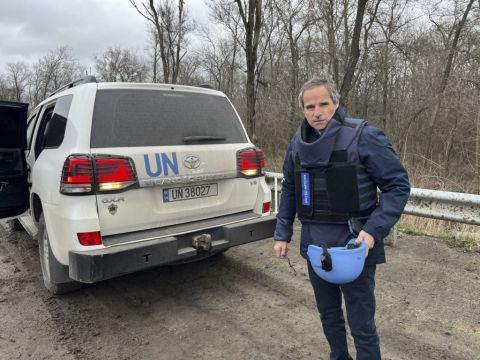The head of the UN’s atomic energy watchdog has returned to the Zaporizhzhia nuclear power plant, a day after saying a deal to protect Europe’s largest nuclear power facility from a catastrophic accident due to the war in Ukraine was “close”.
International Atomic Energy Agency (IAEA) director general Rafael Mariano Grossi crossed the war’s front lines for a second time to reach the plant, which is located in a partially Russia-occupied part of Ukraine where combat has intensified.
The IAEA, which is based in Vienna, Austria, has a rotating team permanently based at the plant.
On my way to #Zaporizhzhya NPP to assess first-hand the #nuclear safety & security situation at the facility. I will continue my efforts to protect the nuclear plant during the ongoing military conflict, & lead our next regular rotation of @iaeaorg experts to & from the site. pic.twitter.com/nWLJn7SbBQ
— Rafael MarianoGrossi (@rafaelmgrossi) March 26, 2023
Advertisement
Mr Grossi told The Associated Press (AP) in an interview on Tuesday that he felt it was his duty to ramp up talks between Kyiv and Moscow aimed at safeguarding the facility.
He met on Monday with Ukrainian president Volodymyr Zelensky and said he would “most probably” head to Moscow in the coming days.
But Mr Zelensky said in a separate interview with the AP that he was less optimistic a deal was near.
“I don’t feel it today,” he said.
Director General of the IAEA @rafaelmgrossi and @ZelenskyyUa visited 🇺🇦Ukraine's #Dnieper hydroelectric station - an essential component for nuclear safety at the #Zaporizhzhya nuclear power plant. pic.twitter.com/0ADlfuie4D
Advertisement— IAEA - International Atomic Energy Agency ⚛️ (@iaeaorg) March 27, 2023
The Kremlin’s forces took over the six-reactor plant after Russia’s full-scale invasion in February 2022, and Mr Zelensky opposes any proposal that would legitimise Russia’s control over the facility.
Mr Grossi has repeatedly urged Mr Zelensky and Russian president Vladimir Putin to allow a protection zone around the plant, which is very near the front line of the war.
The negotiations are specific to preventing a nuclear disaster at the plant and not aimed at securing a broader ceasefire, Mr Grossi told the AP.
The power station’s reactors are shut down and the plant has received the electricity it needs to run the cooling systems needed to prevent a reactor meltdown through one remaining functioning power line.
Interruptions to the outside electricity supply due to the fighting have required plant personnel to switch to emergency diesel generators six times during the 13-month war. When backup power supplies might be needed again was unpredictable, Mr Grossi said.







